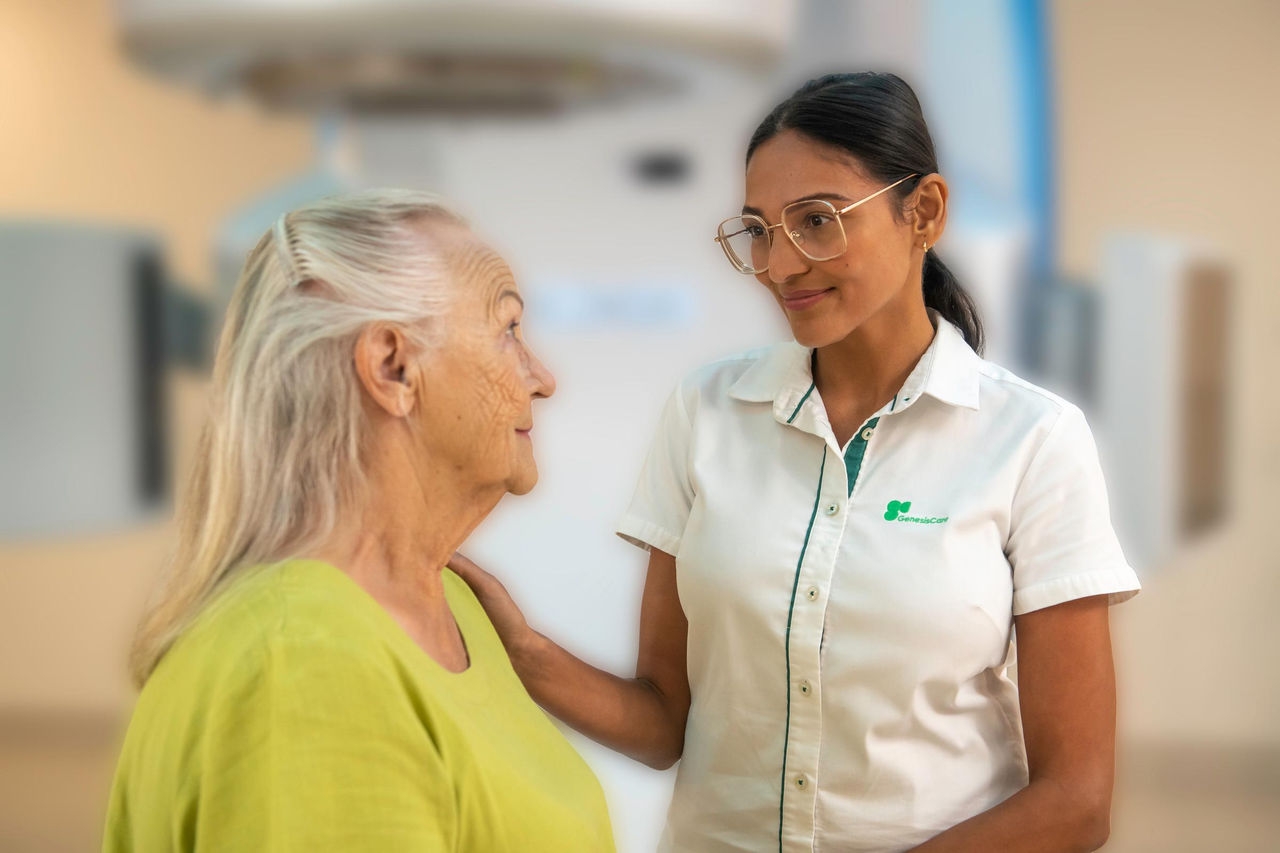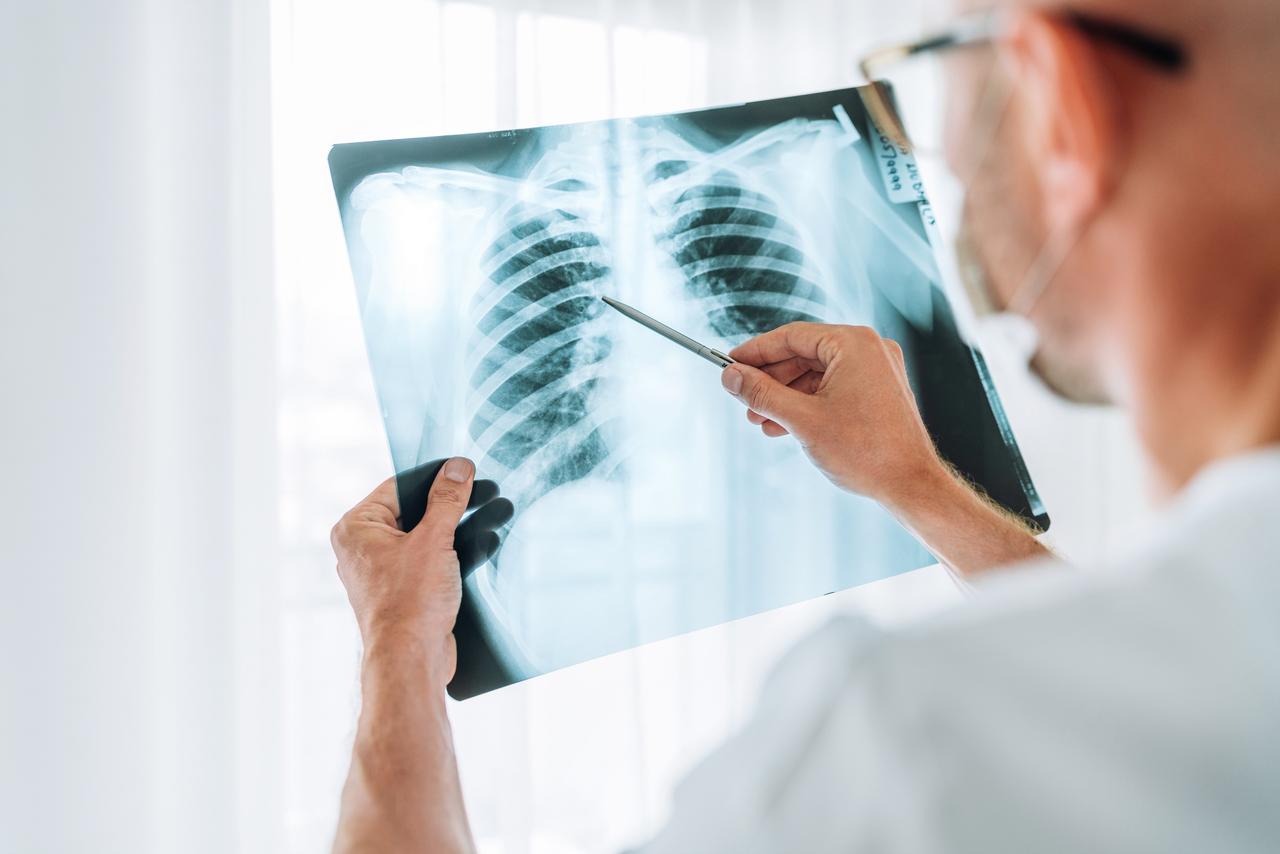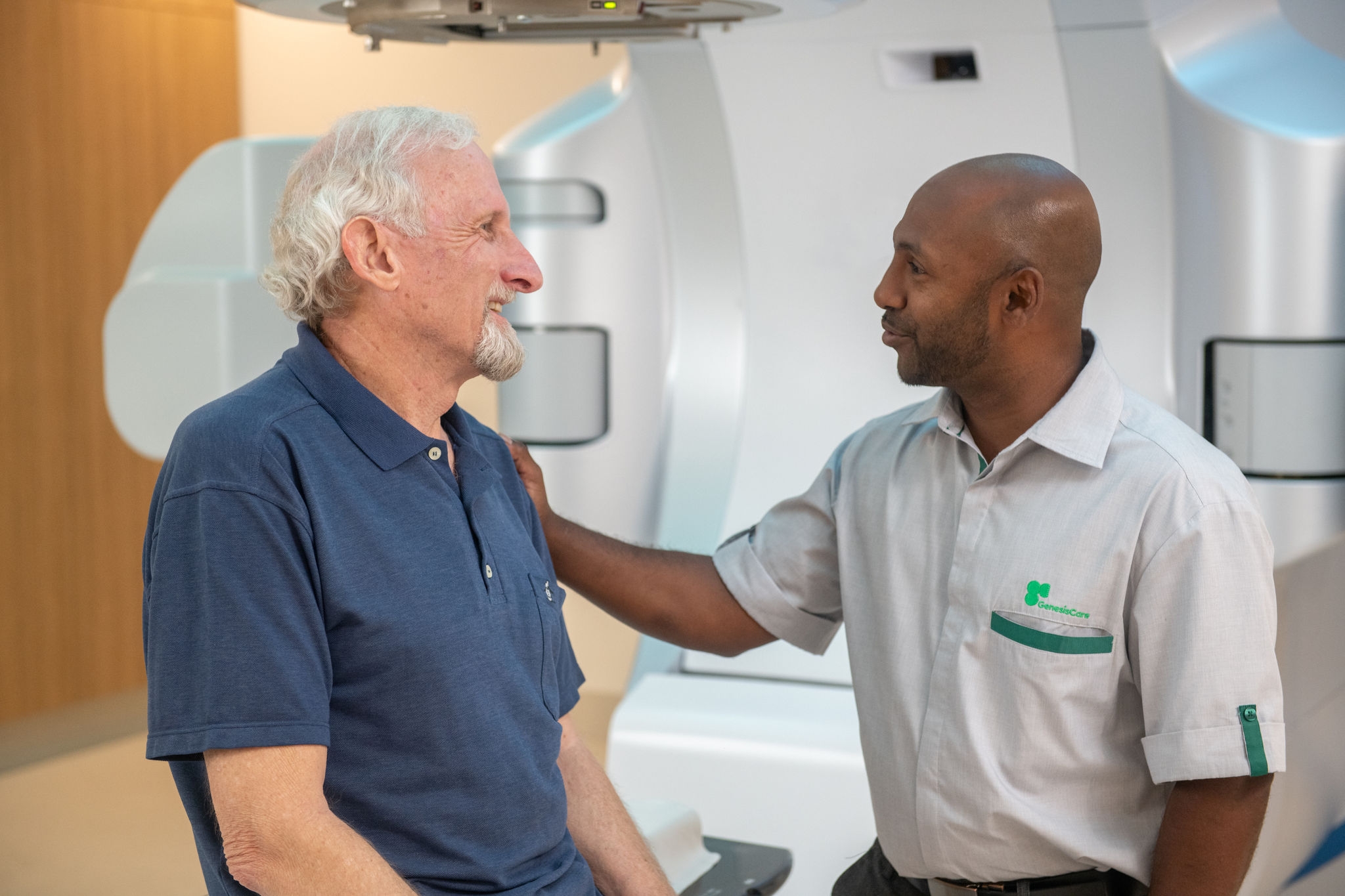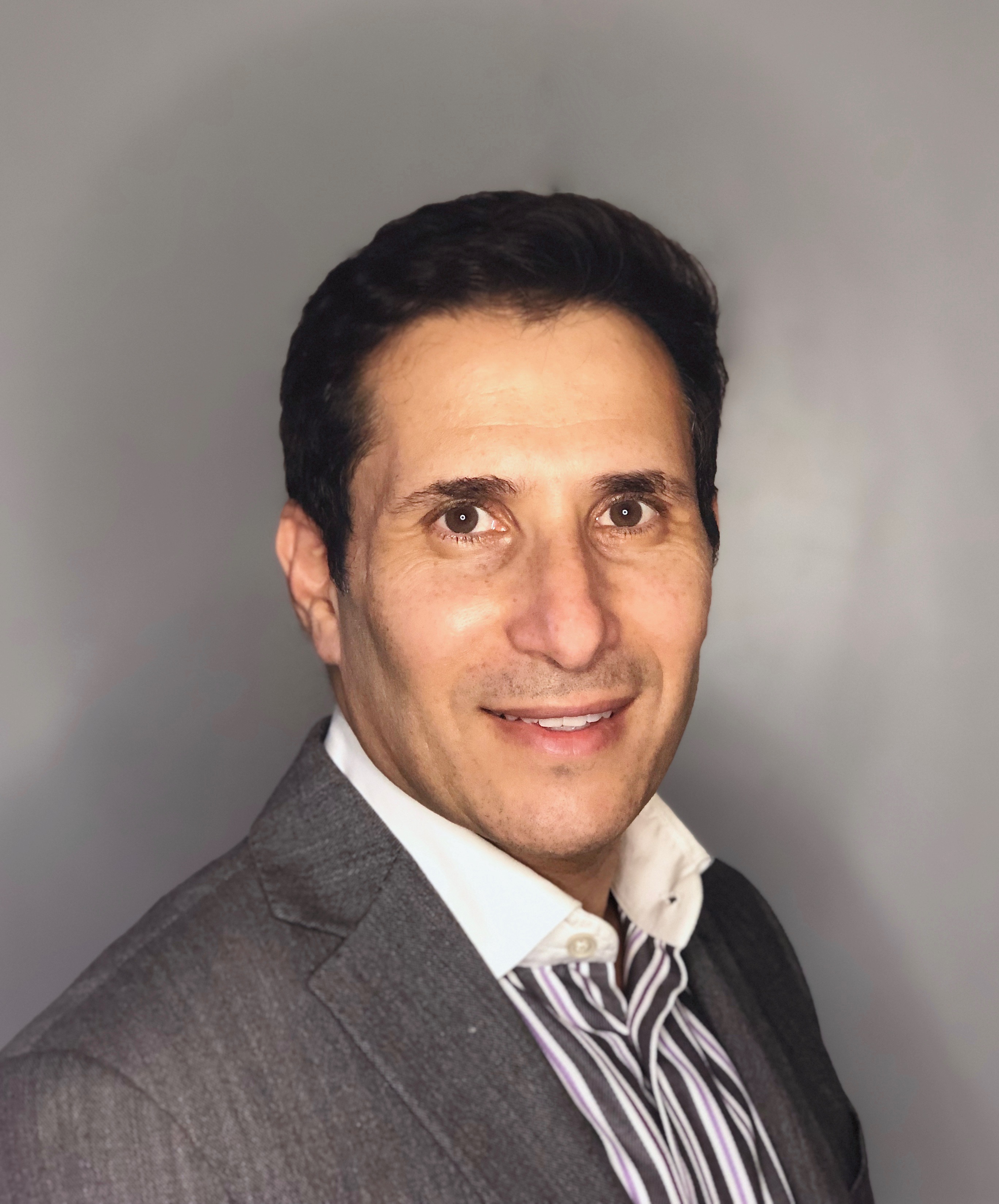Review Date: August 2024
- Patients
- Exploring cancer care
- Conditions we treat
- Lung cancer
What is lung cancer?
What is lung cancer?
The lungs are the main organs for breathing and are part of the respiratory system that includes the nose, mouth, windpipe and airways (large airways, bronchi; smaller airways, bronchioles) to each lung.1 Lung cancer is a cancerous tumour in the tissue of one or both of the lungs.1 Lung cancer was the 5th most commonly diagnosed cancer in Australia in 2023.11
Primary lung cancer starts in the lungs1 and is split into two groups:1,4
1. Non-small cell lung cancer (NSCLC) – the most common type of lung cancer (accounting for about 85% of lung cancers) which includes:1,4
- Adenocarcinoma – starts in the cells that make mucus in the outer part of the lungs
- Squamous cell carcinoma – mainly affects the cells that line the tubes into the lungs. It tends to grow in the centre of the lung and is linked to a history of smoking
- Large cell carcinoma or undifferentiated carcinoma – where the cancer cells are not clearly one of the two subtypes above
2. Small cell lung cancer (SCLC) – Approximately 15% of lung cancers are SCLSC. SCLC tends to start in the middle of the lungs and usually spreads more quickly than NSCLC.1, 4 It also responds quicker to treatment.
Secondary
Secondary or metastatic lung cancer can start somewhere else in the body and spread to the lungs.1
Mesothelioma
Mesothelioma is a rare type of cancer that affects the covering of the lung, called the pleura. It’s almost always caused by exposure to asbestos.1, 3
Chest wall cancer
Cancers that start in the chest wall may affect the lungs but are not thought of as lung cancer.1

Make an enquiry
Contact us today to find out how GenesisCare can help you.
Diagnosis
Diagnosis
There are a range of factors that may increase the potential risk of a lung cancer diagnosis. These risk factors may include:1
- Increasing age
- Tobacco smoking – either current or former
- Exposure to second-hand smoke (also known as passive smoking)
- Occupational substance exposure, which may include asbestos, silica, diesel exhaust, arsenic, cadmium, nickel, soot, and radon
- Family history of lung cancer
- Infection with HIV
- Past chronic lung disease, including for example chronic obstructive pulmonary disease and pulmonary fibrosis
- History of cancer including lung and head and neck cancers
It’s important to note that if you have any or multiple of the above risk factors, it doesn’t necessarily mean that you have lung cancer.1 It is suggested you make an appointment with your GP or specialist to discuss any concerns or questions that you may have.
- Coughing up blood
- A new or changed cough that doesn’t go away
- Chest pain and/or shoulder pain or discomfort – which might be worse when coughing or breathing deeply
- Trouble breathing or shortness of breath
- Trouble swallowing
- Hoarse voice
- Weight loss
- Loss of appetite
- Chest infection that doesn’t go away
- Tiredness or weakness2
If you are experiencing any of these symptoms and they are persistent, it is recommended to make an appointment with your GP.
A range of tests may be performed to analyse symptoms and diagnose lung cancer, as well as determine the type and stage of lung cancer. Following a physical examination, further tests may include:1
- Imaging tests: Such as a chest X-ray, computerised tomography (CT) scan, positron emission tomography (PET) scan or a magnetic resonance imaging (MRI) scan. The objective of imaging-based tests is to understand more about the size and location of the tumour
- Blood or tissue laboratory tests
- Lung biopsy: This involves the removal of a small sample of tissue or fluid to be examined under a microscope
- Sputum cytology: A sample of sputum is examined under a microscope
- Bronchoscopy: A thin tube is inserted via the nose or mouth with the aim being to view the inside of the trachea and large airways in the lungs. Samples can be taken through washings, brushing or biopsy.
Lung cancer can be classified by stage which looks at the size of the tumour and whether it has spread to lymph nodes or other parts of the body. Two systems may be used:1
1. TNM System, which stands for Tumour - Nodes - Metastasisa
- Tumour - size of tumour and how far into the lung it goes
- Nodes - spread to nearby lymph nodes or not
- Metastasis - tumour has spread to other parts of the body
2. Two-stage system for small cell lung cancer
- Limited stage - cancer is on one side of the chest and in one part of the lung with only nearby lymph nodes affected (if any)
- Extensive stage - cancer present throughout the lung, spread to the other lung or lymph nodes on the other side of the chest or other parts of the body
- Note: the TNM system may also be applied to Small Cell Lung Cancer

Screening for lung cancer
A National lung cancer screening program will begin in July 2025. It will target high-risk individuals aiming to detect lung cancer in its early stages, increase the likelihood of successful treatment and improve lung cancer outcomes.5
To learn more about the National Lung Cancer Screening Program, click to our blog post here.
Find a doctor
Search for Lung Cancer specialists in your state.
Treatment options
Lung cancer treatment options
Your treating doctor will discuss the most appropriate option(s) for treatment with you. The options suggested to you may depend upon the stage of the cancer, your overall health, symptom severity, and your personal preference.1

Treatment options include
Radiation therapy uses high energy X-rays or other particles to treat cancer and can be used at all stages.6
Chemotherapy is an approach to cancer therapy which involves the administration of medicine, usually orally or by injection, which is intended to kill cancer cells or minimise their growth and spread. Chemotherapy can be used in conjunction with other cancer treatments.7
Early-stage non-small cell lung cancer may be treated by surgery, with the aim being to remove the tumour. Generally, surgery isn’t recommended for the treatment of small cell lung cancer.1
Targeted therapy refers to treatment with drugs that are designed to specifically attack cancer cells without harming normal cells. These types of drugs affect the way that cancer cells grow, divide, repair themselves or interact with other cells.2
Immunotherapy is a type of treatment that is intended to help your own immune system fight cancer. There are different types of immunotherapy for cancer that work in different ways.2
All cancer treatments may have side effects. The type and severity of side effects will vary between individuals.8,9 You can ask your doctor for detailed information about the side effects which you may experience with any treatment recommended for you.
Recommendations to help you stay well during treatment:
- Get as much rest as possible1,8,9
- Healthy eating is important8,9 but you should also try to think about eating foods that interest you rather than what you think you should eat
- Appetite changes are common, and you may experience taste changes or nausea8
- It may help to eat smaller meals rather than three large ones throughout the day
- Drink lots of fluids - aim for at least 8–10 glasses of fluid per day (this can be from water, soups, smoothies, milk, fruit juices or ice cubes for example)8
- Reach out to support groups and others who have had cancer treatment9
- Record your side effects in a diary or journal1
- Speak to your doctor about incorporating some gentle exercise into your weekly routine8,9
- It is important to acknowledge when you are fatigued and rest when you need to1
- Ask for and accept help from family, friends and neighbours9
- Be open with employers about your treatment and discuss flexible working options if you need them.9
Find a centre
Contact us today to find out how GenesisCare can help you.
Support services
Support services
Content reviewed by
A/Prof Jeremy Ruben
MBBCh(Hons), MMed, FCRadOnc, FRANZCR, MD
Radiation Oncologist
Malvern (Cabrini Hospital)

- Australian Government Cancer Australia. Breast cancer. Updated January 2023. Available: https://www.canceraustralia.gov.au/cancer-types/breast-cancer/overview [accessed May 2023].
- Australian Government Australian Institute of Health and Welfare. Cancer data in Australia. Web report. October 2022. Available: https://www.aihw.gov.au/reports/cancer/cancer-data-in-australia/contents/about [accessed May 2023].
- Cancer Council. Understanding Breast Cancer. July 2022. Available: https://www.cancer.org.au/cancer-information/types-of-cancer/breast-cancer [accessed May 2023].
- Cancer Council. Early detection of breast cancer. Available: https://www.cancer.org.au/cancer-information/causes-and-prevention/early-detection-and-screening/early-detection-of-breast-cancer [accessed May 2023].
- Stowe HB, Andruska ND, Reynoso F, Thomas M, Bergom C. Heart Sparing Radiotherapy Techniques in Breast Cancer: A Focus on Deep Inspiration Breath Hold. Breast Cancer (Dove Med Press). 2022;14:175-186.
- NIH National Cancer Institute Dictionary of Cancer Terms. Hypofractionated radiation therapy. Available: https://www.cancer.gov/publications/dictionaries/cancer-terms [accessed May 2023].
- Freislederer P, Kügele M, Öllers M, et al. Recent advances in Surface Guided Radiation Therapy. Radiat Oncol. 2020;15(1):187.
- Cancer Council. Understanding Radiation Therapy. December 2021. Available: https://www.cancer.org.au/cancer-information/treatment/radiation-therapy [accessed May 2023].

You are leaving our website
You are now leaving our website. GenesisCare do not control this content and therefore are not responsible for its accuracy or reliability.

You are leaving our website
You are now leaving our website. GenesisCare do not control this content and therefore are not responsible for its accuracy or reliability.

You are leaving our website
You are now leaving our website. GenesisCare do not control this content and therefore are not responsible for its accuracy or reliability.
Disclaimer:
This website is provided for information purposes only. Nothing on this website is intended to be used as medical advice, or to diagnose, treat, cure or prevent any disease. It should not be used as a substitute for your own health professional's advice. Any medical procedure or treatment carries risks. Before proceeding with treatment, you should discuss the risks and benefits of the treatment with an appropriately qualified health practitioner. Individual treatment outcomes and experiences will vary.
